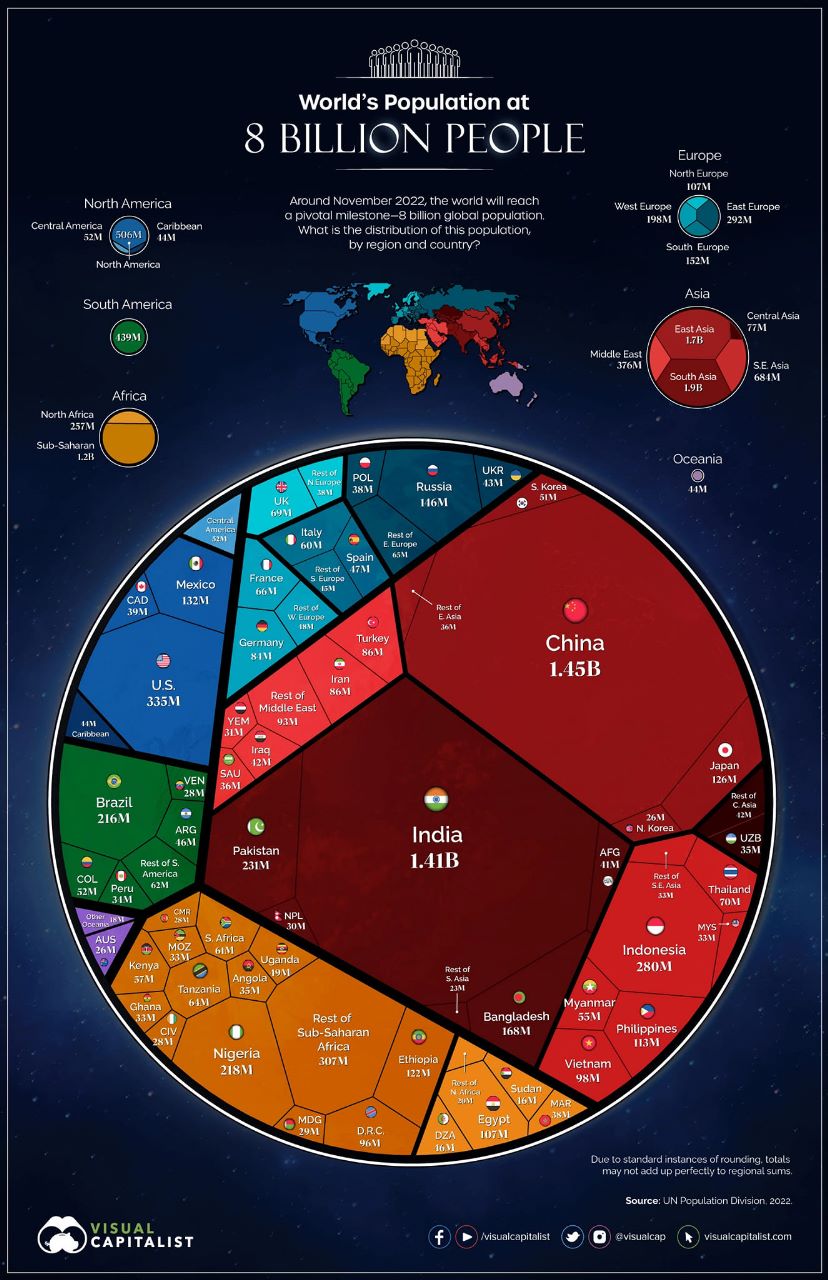The World's Population Has Reached 8 Billion - How Is The World Changing Now?
According to the $ United Nations$ , the world's population has reached 8 billion mark on 15 November.. Since the world population reached seven billion for the first time in 2011, an additional one billion people have been added in the previous 11 years. The issue of overpopulation, which is connected to climate change, is heightened as a result.
Author:Camilo WoodReviewer:Elisa MuellerNov 16, 202218.7K Shares721.1K Views

According to the United Nations, the world's population has reached 8 billionmark on 15 November.. Since the world population reached seven billion for the first time in 2011, an additional one billion people have been added in the previous 11 years. The issue of overpopulation, which is connected to climate change, is heightened as a result.
“„This unprecedented growth is due to the gradual increase in human lifespan owing to improvements in public health, nutrition, personal hygiene, and medicine. It is also the result of high and persistent levels of fertility in some countries.- United Nations
Population Growth In Developing Countries
Asia & Oceania (with their extra 1.2 billion people) and Africa (with their 300 million) are two of the fastest-growing regions in the world during the last quarter century (an additional 700 million individuals). Half of the predicted global growth in population between now and 2050 is likely to occur in a few major nations in Africa and Asia, suggesting that this trend will continue.
The percentage of people living in developing nations has risen from 66% in 1950 to 83% currently and should reach 86% by 2050. This emphasizes the necessity of addressing issues like as hunger, access to clean water, sanitation, and health services, and connecting people to inexpensive, renewable power and the Internet.
828 million people, mostly in underdeveloped nations, go to bed hungry every night. According to UNCTAD's Inclusive Growth Index, these nations, primarily in Africa, have the worst socioeconomic inequality and living circumstances. Half the population in more than three-quarters of African nations lacks clean, potable water. In some developing countries, 1 in 100 have broadband Internet.
Faster population increase in emerging nations makes climate action vital. Developing nations struggle to satisfy expanding food and energy requirements and will need help to fulfill future demands without excessive natural resource consumption, pollution, and waste.
High-performing economies create double the garbage per capita of underdeveloped nations. Both wealthy and poor nations must "decouple" prosperity from CO2 emissions to ensure a fair low-carbon transition. Developed nations should redouble their efforts toward a low-emissions future and provide poor countries the technology, skills, and financial assistance they need to shift to less polluting industries and sectors. COP27 must prioritize this.
Fast population expansion in emerging nations offers numerous issues, but it may also provide economic possibilities, as in Africa, where the working-age population is growing compared to younger and older generations. If the world can't sever the relationship between pollution and wealth, the difficulties will eclipse the potential.
Population Growth Is Declining
Maybe you recall Elon Musk's tweet from the beginning of 2022: "If there aren't enough people for Earth, then there surely won't be enough for Mars." Unfortunately for him, Mars still poses a threat to his Mars aspirations.
The United Nations Population Fund (UNFPA) has been running an advertising campaign highlighting the slowing rate of global population increase, which, according to the campaign, will have dropped to less than one percent annually by 2020. According to the UN estimate, the world's population won't hit 9 billion until 2037, a span of almost 15 years.
“„Total fertility rates have dropped dramatically in several nations during the last few decades. Nearly two-thirds of the world's population now resides in a nation or region with fertility rates lower than 2.1 births per woman, the threshold at which populations with low mortality rates experience long-term zero growth.- World Population Prospects 2022
In contrast, data shows that nations with the greatest fertility rates also have the lowest per-capita earnings. As a result, the proportion of the world's population living in the poorest nations, which are concentrated in parts of sub-Saharan Africa, has grown.
More than half of the worldwide population growth forecast between now and 2050 will come from sub-Saharan African countries. UNFPA claims that poor and lower middle income nations contributed the most to the world's population reaching 8 billion. On the other side, roughly 250 million came from high-middle-income nations.
Final Thought
The United Nations predicts that the world population will reach 9.7 billion by 2050, but whether or not the planet can sustain so many people and their material requirements remains to be seen.
In addition to population projections, factors such as climate change and international politics are projected to have a significant impact on international migration. Immigration has been crucial to maintaining population levels in the United States and Western Europe, but it has become a divisive political issue. Even greater reluctance to accept immigrants has been shown by other nations experiencing population decline, such as Japan.

Camilo Wood
Author
Camilo Wood has over two decades of experience as a writer and journalist, specializing in finance and economics. With a degree in Economics and a background in financial research and analysis, Camilo brings a wealth of knowledge and expertise to his writing.
Throughout his career, Camilo has contributed to numerous publications, covering a wide range of topics such as global economic trends, investment strategies, and market analysis. His articles are recognized for their insightful analysis and clear explanations, making complex financial concepts accessible to readers.
Camilo's experience includes working in roles related to financial reporting, analysis, and commentary, allowing him to provide readers with accurate and trustworthy information. His dedication to journalistic integrity and commitment to delivering high-quality content make him a trusted voice in the fields of finance and journalism.

Elisa Mueller
Reviewer
Elisa Mueller, a Kansas City native, grew up surrounded by the wonders of books and movies, inspired by her parents' passion for education and film.
She earned bachelor's degrees in English and Journalism from the University of Kansas before moving to New York City, where she spent a decade at Entertainment Weekly, visiting film sets worldwide.
With over 8 years in the entertainment industry, Elisa is a seasoned journalist and media analyst, holding a degree in Journalism from NYU. Her insightful critiques have been featured in prestigious publications, cementing her reputation for accuracy and depth.
Outside of work, she enjoys attending film festivals, painting, writing fiction, and studying numerology.
Latest Articles
Popular Articles
